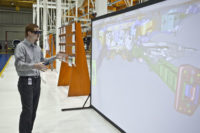AUBURN HILLS, MIChrysler Group vice president of manufacturing Frank J. Ewasyshyn has been inducted into the Shingo Prize Academy in recognition of his efforts to increase both efficiency and flexibility at the automaker.
The Shingo Academy, which is dedicated to the pursuit of lean manufacturing, is managed by the Utah State University College of Business (Logan, UT). Ewasyshyn accepted the honor at the Shingo Prize Annual Conference and Awards Ceremony in Grand Rapids, MI.
In 2004, Chrysler enjoyed an 8 percent improvement in productivity, the best in the industry, and the company expects that kind of performance to continue into 2005. Based on warranty expenses, Chrysler Group has also improved its quality by 40 percent since 2000.
"We have seen significant improvement in our manufacturing organization in recent years, and I am proud to be a part of it," Ewasyshyn says. "With the dedicated team we have in place, I am confident that operations will continue improving as we move forward."
Ewasyshyn, a 28-year Chrysler veteran and an expert in robotics, has been in charge of manufacturing operations at DaimlerChrysler's Chrysler Group since May 2004. As such, he is in charge of 64,000 employees, as well as all vehicle and component production for the company.
In his address, Ewasyshyn outlined a number of lean manufacturing initiatives and processes that he says are providing Chrysler with real a competitive advantage. These include production lines capable of producing more than one vehicle model, team-based work structures, workstation upgrades and increased support for assembly line operators.
The company is also implementing "chaining flexibility," or the ability to build similar vehicles at multiple plants, and "platform flexibility," the ability to develop multiple vehicles using similar architectures.
Along these same lines, Ewasyshyn notes that at Chrysler's Toledo Supplier Park Complex, the company is introducing additional flexibility into its business model by making key suppliers responsible for major elements of the manufacturing process, such as body, paint and chassis production.
"The marketplace dictates that we must be globally competitive in our manufacturing operations to be successful," says Ewasyshyn. "The new operating principles we are implementing help to ensure that."

